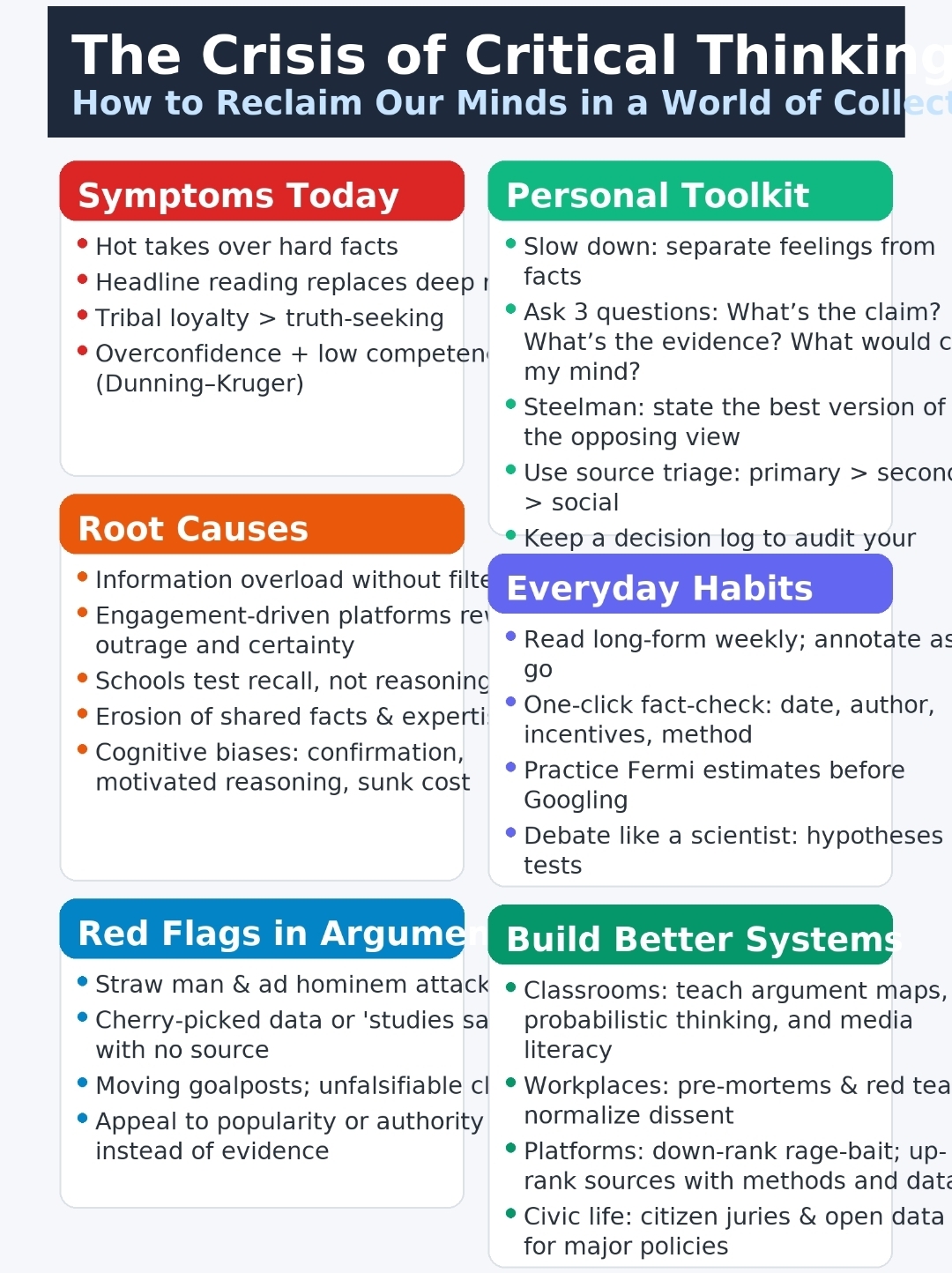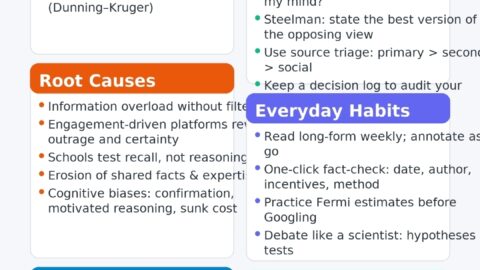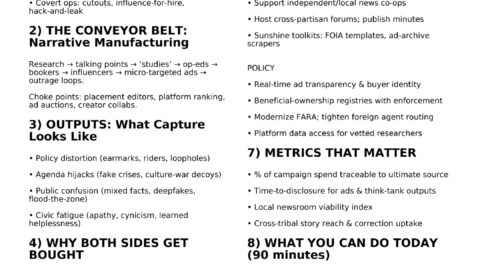In today’s fast-paced, information-saturated world, the very essence of critical thinking is under siege. Imagine waking up one day and realizing that most people around you no longer question anything. The world has become loud, fast, and oversaturated with information, but where is the discernment and growth that once defined human minds? What happens when critical thinking vanishes, when the ability to reason, challenge, and reflect is replaced by surface-level opinions, echo chambers, and instant reactions?
This article delves into the disturbing truth behind the rise of collective stupidity, a phenomenon where masses of people blindly accept narratives and surrender their intellectual independence without even realizing it. At the core of this crisis is a modern culture that discourages deep thought, where the pressure to conform outweighs the courage to think for oneself. But there’s hope: we can reclaim our minds and rebuild a society where critical thinking is not just a skill but a moral responsibility.
The Disappearance of Critical Thinking
The first uncomfortable truth is that critical thinking, once a fundamental human skill, is increasingly seen as inconvenient. In today’s world, the environment rewards speed, emotional responses, and conformity rather than contemplation and reasoning. This shift isn’t accidental; it’s part of a larger system that conditions us away from critical thought. From social media algorithms to educational systems prioritizing memorization over exploration, society actively discourages deep, reflective thinking. Philosopher Noam Chomsky warned decades ago about the “manufacturing of consent,” where people are conditioned to consume without questioning and to agree without understanding.
The Problem of Information Overload
One of the primary drivers of this intellectual decline is information overload. According to neuroscientist Daniel Levitin, the average person processes five times more information today than just a few decades ago. Our brains were not built to handle this constant barrage of messages, notifications, and news updates. In response, our minds rely on mental shortcuts—cognitive biases and groupthink—instead of evaluating ideas critically. Social proof, where we take cues from others, is often manipulated, especially on social media, where posts with the most likes and shares are presumed to be true, even without reason to back them up.
The Decline of Deep Reading
Another disturbing trend is the decline of reading, especially deep reading. As neuroscientist Maryanne Wolf observes, digital media is rewiring our brains, causing us to skim and jump between tabs, struggling to focus on longer texts. But critical thinking requires sustained attention. We can’t analyze, reflect, or truly understand if our attention span is constantly fractured. The late Carl Sagan’s warning about our society’s dependence on science and technology highlights the importance of critical thinking. Yet, as people become more consumed by distractions, the ability to reflect on the systems we depend on is being eroded.
The Emotional Challenge of Thinking Critically
Thinking critically is uncomfortable. It forces us to admit that we don’t know everything, challenges our egos, and may lead us into cognitive dissonance, where our cherished beliefs clash with new evidence. In a culture that values certainty and identity above all, this is deeply threatening. Instead of thinking, we retreat into our tribes, repeating mantras, avoiding critical questions, and memorizing slogans. This decline in thinking is more than just an intellectual issue—it’s a social shift toward mental laziness. The consequences of this are dangerous, as without critical thinking, people stop questioning and become vulnerable to manipulation, propaganda, and fear.
Who Benefits from a Society That Stops Thinking?
So, who benefits when a population no longer thinks for itself? It’s not just the politicians and corporations that profit from people’s passive consumption of information—it’s the systems that keep people distracted, divided, and emotionally reactive. The systems of control thrive when people are disconnected from their own intellectual independence. The key to breaking free from this manipulation is reclaiming the ability to think for oneself and asking the difficult questions that challenge the status quo.
The Education System and Its Role in Suppressing Critical Thinking
John Taylor Gatto, an award-winning teacher and outspoken critic of traditional schooling, argued that modern education does not exist to create independent thinkers but to prepare students for factory life—predictable, obedient, and non-disruptive. Schools teach us what to think, not how to think. From an early age, children are evaluated not on the originality or depth of their thoughts but on their ability to memorize and regurgitate information. Curiosity is often treated as a distraction, and conformity is rewarded. This pattern continues into adulthood, where questioning consensus or holding unpopular views can cost us socially or professionally. Silence becomes complicity, and the fear of social exclusion silences our most pressing doubts.
Comfort vs. Critical Thinking: A Choice to Make
Psychologist Erich Fromm observed that many people secretly want to surrender their freedom of thought because true freedom comes with responsibility—and responsibility can be terrifying. Thinking for yourself means facing the uncertainty of truth, and for many, that’s too great a burden. So, instead of thinking critically, people choose comfort, distraction, and simplicity over complexity, which makes them easier to control. Social media has exacerbated this issue, transforming platforms that were once spaces for connection into battlegrounds of opinion wars, outrage cycles, and algorithmic manipulation. These platforms reward engagement, not truth, and encourage emotional, often angry responses rather than thoughtful reflections.
The Psychology Behind Collective Stupidity
One of the most important insights in understanding collective stupidity is recognizing the emotional nature of our brains. Nobel Prize-winning psychologist Daniel Kahneman explained that our brains operate on two systems: the fast, emotional system that makes snap judgments, and the slow, analytical system that requires effort. In a world that values speed over depth, most people are stuck in “fast mode.” They rely on mental shortcuts and heuristics that often lead to incorrect conclusions. This creates fertile ground for manipulation. Politicians, marketers, and media outlets understand how to exploit our mental shortcuts by framing complex issues in simple, emotionally charged terms.
Groupthink and the Dangers of Conformity
Groupthink is a psychological phenomenon where the desire for harmony or conformity in a group leads to irrational or dysfunctional decisions. Social psychologist Irving Janis documented how even highly intelligent people can make catastrophic decisions when they suppress dissent for the sake of unity. Challenging the group requires integrity and courage, yet progress has always come from those who dared to think differently—Galileo, Darwin, Martin Luther King. These individuals were rejected, ridiculed, or attacked for their ideas, but they persisted. The ability to think critically in a society that punishes doubt is a revolutionary act that requires resilience, self-respect, and the quiet power that comes from knowing your beliefs are your own.
The Rise of Collective Stupidity and Its Implications
So why do so many people feel lost, anxious, or unfulfilled despite having more information than any generation before? The answer lies not in what we have but in what we’ve lost—the habit of inner dialogue and the capacity to think deeply. We’ve outsourced our thinking to machines, media, and public opinion. Algorithms cannot tell you what is true for you, and trending topics cannot replace your inner voice. To reclaim critical thinking, we must cultivate awareness—awareness of our mental habits, the sources we consume, and the influence of external forces on our beliefs.
The Power of Critical Thinking: A Call to Action
Critical thinking is not just an intellectual skill—it is a spiritual act. It involves the courage to question your beliefs, to embrace uncertainty, and to reject intellectual laziness. It requires reading, listening, and reflecting. It’s about engaging with opposing views not to attack them but to understand them. It’s a mental discipline that helps us go beyond binaries, beyond “us vs. them,” and into the realm where true understanding is born. In today’s culture of noise, wisdom offers silence, and in an era of mass conformity, wisdom dares to be free.
Critical thinking is essential for reclaiming our freedom. Once you start thinking critically, you begin to see through the illusion, understanding the systems of control that manipulate you. The most powerful change begins not with mass movements but with one person who chooses to think clearly in a world that doesn’t. The responsibility to think is yours alone, and when you rise to it, you become a light in the darkness—a voice of reason in a world of reactionaries.
Conclusion: Reclaim Your Power through Critical Thinking
The rise of collective stupidity is a symptom of a world that is distracted and afraid to face the uncomfortable truth. But every moment you pause to reflect, every time you ask a question instead of assuming the answer, you reclaim your power. You can no longer be a puppet controlled by unseen forces. Instead, you become an active seeker of truth, illuminating the world around you. The most revolutionary thing you can do right now is not to shout, but to think. Let the others sleepwalk through slogans and screens, but you have awoken. And once you awaken, you can never go back.
Here’s a point-by-point breakdown of each concept from the transcript:
1. The World’s Noise and Information Overload (0:05-0:24)
- Core Concept: The overwhelming saturation of information and noise has caused people to lose the ability to critically question or think deeply.
- Effect: This environment fosters passive acceptance rather than active thinking, and people begin to operate on autopilot without reflection.
- Example: The speaker imagines waking up in a world where most people no longer question anything, indicating the rise of passive consumption of information.
2. The Decline of Critical Thinking (0:25-0:56)
- Core Concept: Critical thinking has diminished significantly, replaced by shallow opinions, instant reactions, and collective echo chambers.
- Effect: People blindly accept narratives and lose their intellectual independence without even realizing it.
- Example: Collective stupidity is presented as the result of people adopting surface-level thinking and surrendering their ability to question.
3. Information Overload and the Dulling of the Mind (0:58-1:04)
- Core Concept: Society’s overwhelming bombardment of information makes it difficult for individuals to think critically and deeply.
- Effect: People rely on mental shortcuts and cognitive biases instead of critically evaluating information.
- Example: The speaker discusses the rise of “information overload,” where the mind no longer processes information meaningfully and instead resorts to default reactions.
4. Manufacturing Consent (1:00-1:17)
- Core Concept: According to Noam Chomsky, power structures create an environment where people consume without questioning, leading to easily manipulated masses.
- Effect: People are conditioned to accept information without critical engagement, making them easier to deceive and manage.
- Example: Chomsky’s idea that media and propaganda condition people to passively accept narratives instead of critically assessing them.
5. The Challenge of Critical Thinking in Modern Society (1:32-1:38)
- Core Concept: Thinking critically is now discouraged because it conflicts with the fast-paced, emotionally reactive culture of today.
- Effect: The modern environment rewards emotional responses and conformity, leaving little room for deep contemplation.
- Example: The rise of outrage culture and the prioritization of speed over thoughtful engagement are seen as contributors to the erosion of critical thinking.
6. Information Overload and Cognitive Shortcuts (2:41-3:13)
- Core Concept: The sheer amount of daily information forces people to rely on cognitive shortcuts (like social proof) rather than evaluating information critically.
- Effect: People default to groupthink and social validation to navigate complexity, which leads to the spread of collective stupidity.
- Example: The use of social proof, where people assume something must be true simply because many others like it or agree with it.
7. The Decline of Deep Reading and Focus (3:52-4:06)
- Core Concept: The shift away from deep reading to skimming and multitasking has contributed to a decline in critical thinking.
- Effect: The fractured attention span of the modern individual makes it harder to engage in sustained, reflective thinking.
- Example: Neuroscientist Maryanne Wolf’s observations about how digital media rewires the brain and the impact on long-form reading and focus.
8. Carl Sagan’s Warning about Science and Technology (4:30-4:41)
- Core Concept: Carl Sagan warned about society’s dependency on science and technology, yet the public remains largely ignorant of how these systems work.
- Effect: This ignorance leads to a lack of critical thought regarding the systems we depend on, especially when it comes to technological and scientific advances.
- Example: Sagan’s observation that people are often unaware of the systems they depend on, which leads to a lack of inquiry and critical analysis.
9. The Difficulty of Critical Thinking (5:00-5:18)
- Core Concept: Critical thinking challenges our egos and beliefs, which makes it uncomfortable and often avoided.
- Effect: The discomfort of challenging one’s beliefs or confronting cognitive dissonance often leads people to avoid engaging in critical thought.
- Example: The speaker emphasizes that critical thinking forces people to face uncomfortable truths and contradictions within their own belief systems.
10. The Erosion of Thinking: Mental Laziness (5:39-6:01)
- Core Concept: A cultural shift towards mental laziness is happening, where people prefer comfort over intellectual rigor.
- Effect: This shift makes individuals more susceptible to manipulation and less likely to question the status quo.
- Example: The consequences of abandoning critical thinking lead to widespread conformity, making it easier for others to manipulate and control individuals.
11. The Role of Social Media in Eroding Thought (6:23-6:58)
- Core Concept: Social media has transformed from a platform for connection to a space for outrage cycles, opinion wars, and algorithmic manipulation.
- Effect: Social media’s focus on speed, emotional engagement, and confirmation biases encourages people to react without thinking deeply.
- Example: The speaker critiques social media platforms for prioritizing engagement (likes, shares, comments) over truth, leading to the spread of misinformation.
12. McLuhan’s Theory: The Medium is the Message (9:12-9:25)
- Core Concept: Marshall McLuhan’s theory that the medium of information affects how we think and process it.
- Effect: Modern media, with its emphasis on speed and spectacle, shapes the way we think, often discouraging deep reflection in favor of fast responses.
- Example: The speaker notes McLuhan’s foresight about how the medium influences the way people think, emphasizing how today’s digital platforms reward reaction over thoughtful engagement.
13. Confirmation Bias and Its Impact (13:15-14:00)
- Core Concept: Confirmation bias is the tendency to accept information that aligns with our beliefs while rejecting opposing views.
- Effect: This bias makes people more resistant to changing their minds, even in the face of contradictory evidence.
- Example: The speaker challenges the audience to think about how often they engage with opposing viewpoints and how confirmation bias affects their beliefs.
14. The Dangers of Groupthink (14:37-15:01)
- Core Concept: Groupthink occurs when individuals suppress their doubts or disagreements in order to conform to the group consensus.
- Effect: This can lead to irrational decisions, as seen in corporate and historical disasters.
- Example: Irving Janis’s research into groupthink is cited to show how even intelligent people can make poor decisions by suppressing dissent for the sake of unity.
15. The Cost of Critical Thinking: Rebellion Against Society (15:46-16:13)
- Core Concept: The act of critical thinking is seen as rebellion in a society that punishes questioning and promotes certainty over humility.
- Effect: Thinking critically may lead to being misunderstood, ostracized, or even hated, but it also brings clarity and self-respect.
- Example: The speaker highlights how the cost of thinking critically is high, but the rewards include personal growth and the courage to stand by one’s beliefs.
16. The Loss of Inner Dialogue and Reflection (16:16-16:40)
- Core Concept: The loss of inner dialogue, the ability to reflect on one’s beliefs, has led to an erosion of critical thinking and self-awareness.
- Effect: People have outsourced their thinking to machines, media, and public opinion, leaving their inner voice unheard.
- Example: The speaker emphasizes the importance of metacognition—thinking about one’s own thinking—and how this practice can help reclaim intellectual independence.
17. The Practice of Metacognition and Dialectical Thinking (16:44-17:10)
- Core Concept: Metacognition (thinking about your thinking) and dialectical thinking (holding opposing ideas in tension) are tools for developing critical thinking.
- Effect: These practices help individuals avoid binary thinking, broaden their perspectives, and develop true understanding.
- Example: The speaker encourages the audience to engage in these practices to cultivate mental strength and intellectual flexibility.
18. The Path to Wisdom Through Stillness (17:29-18:03)
- Core Concept: True wisdom comes from stillness and quiet reflection, as emphasized by Jiddu Krishnamurti.
- Effect: Wisdom emerges when individuals slow down, embrace complexity, and remain open to learning.
- Example: The speaker underscores the importance of stillness in thinking, contrasting it with the noise and speed of modern society.
19. Critical Thinking as a Spiritual Act (20:07-20:11)
- Core Concept: Critical thinking is not just an intellectual skill, but a spiritual act that honors truth over comfort and freedom over approval.
- Effect: This act of intellectual rebellion is essential for personal growth and freedom in a world dominated by manipulation.
- Example: The speaker emphasizes that critical thinking is a form of spiritual practice, where individuals honor truth and embrace intellectual humility.
20. The Illusion of Identity and the Need for Evolution (20:50-21:10)
- Core Concept: People often define themselves by their beliefs, but true freedom and growth come from detaching one’s identity from fixed beliefs.
- Effect: Letting go of rigid identities opens up the possibility for evolution, learning, and change.
- Example: The speaker argues that we are not defined by our beliefs or affiliations, but by our capacity to evolve and learn.







